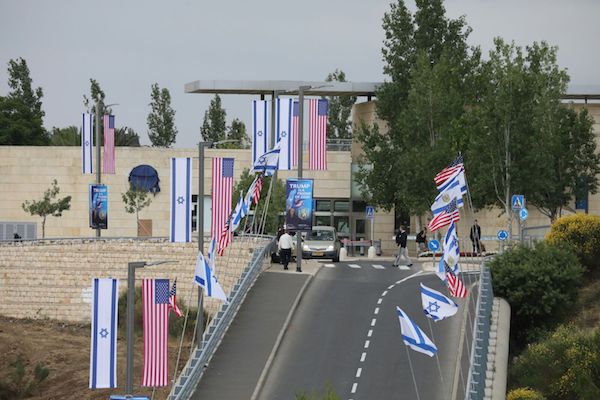Policy experts warn that Trump’s decision could amplify Palestinian hopelessness, which along with other events could lead to violence. It could also wake people up to reality, however, and that may not be a bad thing.

The streets of Jerusalem are lined with American and Israeli flags, and the signs for the new U.S. Embassy have gone up. But as Israel celebrates the U.S. Embassy moving to Jerusalem, Palestinian and Israeli policy experts warn that the Trump administration’s decision could have potentially dangerous consequences.
“The move has filled the Palestinian people with frustration and emphasized the situation of hopelessness, of lacking any serious hope of developments [coming from] negotiations,” said Professor Omar Yousef, head of the graduate program in Jerusalem Studies at Al Quds University.
The Trump administration broke decades of international consensus by moving the embassy and recognizing Jerusalem as Israel’s capital. Until May 14, every foreign embassy in Israel was in Tel Aviv, a diplomatic protest of sorts — a refusal to recognize Israel’s illegal annexation of East Jerusalem.
That frustration is being channeled into calls to demonstrate, Yousef added. “I’m afraid it may erupt into violence because even peaceful demonstrations are provoked by the police and it leads to clashes.”
“There will be blood,” warned Daniel Seidemann, founder and director of Terrestrial Jerusalem, an Israeli NGO that tracks political developments in the city. “Utter hopelessness is the great destabilizer.”

“I’m not sure that there will be significant violence this week — it’s not generally geopolitical events that spur convulsive violence,” Seidemann clarified, “but we’ve got a perfect storm of Jerusalem Day, the move of the embassy, Nakba Day, the March of Return in Gaza, Ramadan.”
Apart from the potential violence, the move, experts say, has dealt a fatal blow to the U.S.-led peace process.
“It puts the United States in a position where it is so identified with one side that it cannot be an honest broker in the future,” explained Yudith Oppenheimer, executive director of Ir Amim, an Israeli rights and advocacy group that focuses on Jerusalem. “The U.S. had a huge role in mediating political processes in the Middle East.”
“The U.S. has disqualified itself for the foreseeable future,” Seidemann concurred. “The old order is dead, the new order has yet to emerge.”
However, Yousef suggested, the disqualification of the U.S. as a mediator in the peace process could provide the Palestinians with the much-needed impetus to shift strategy.
“Moving the embassy was the first step that said: the king is naked,” Yousef said. “The king was always naked, just nobody was talking about it.”
“Maybe this will help the Palestinians break out of their older routines of the past two decades,” Yousef continued. “Now they should revise their strategy. They based their strategy on the U.S. being a fair broker, but it was not.”
Rumors of a new U.S. peace proposal, Trump’s “deal of the century,” have accompanied the plan to move embassy. According to Israeli media reports, the plan includes carving four of East Jerusalem’s Palestinian neighborhoods — Abu Dis, Shuafat, Issawiya, and Jabel Mukaber — leaving the Old City in Israeli hands.

Such a plan, Yousef said, “shows clear support Netanyahu’s [right-wing] agenda. This proposal is to cut the extremities of the city, but leave the heart still controlled by the Israeli government.”
Oppenheimer, on the other hand, has doubts about whether such a plan even exists. “We’ve already seen Trump attempt all sorts of trial balloons and nothing happens.”
Seidemann was equally skeptical about Trump’s rumored peace proposal: “That plan has as much chance as the United States announcing Baltimore as its capital.”
Peace plan or no peace plan, the embassy move will only further embolden an already emboldened Netanyahu to double-down on the occupation of East Jerusalem, Seidemann concluded. “If you think that you can have the epicenter of a conflict, with regional and global ramifications, in which you have one national collective permanently with rights, and the other national collective without rights, you’re smoking something.”


